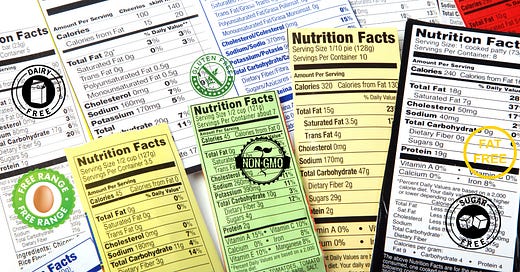Whenever a product is marketed as gluten-free, dairy-free, organic, non-GMO, sugar-free, fat-free, free-range, or wild—to name a few—it’s often a distraction: “Look here, but don’t look over there.” I enjoy examining food products because their marketing tactics follow the same principle: highlight what’s included while diverting attention from what isn’t or what’s been added.
Recently, I worked with a young patient who proudly shared her order from Smoothie King: a drink called ‘Angel Food SLIM.’ While I generally appreciate Smoothie King for being a better option compared to many shake establishments that load up on sugar and skimp on protein, the word ‘SLIM’ raised a red flag. So, during our session, I decided to look it up.
The ‘SLIM’ label referred to its lower calorie count than other smoothies. However, its macronutrient profile told a different story: 95% carbohydrates, 0% fat, and 5% protein. While it was lower in calories, nearly all of those calories came from fruit, which exacerbated her already ‘unhealed’ insulin levels (fasting insulin >3 is ‘unhealed’). This impacted her ability to lose fat while driving up inflammation and negatively affecting her liver markers.
Here’s the thing: when people claim that simply reducing calories is the key to health, consider this. If you consume 1,500 calories of pure sugar versus 1,500 calories of protein or fat, do you think your body’s physiological signals- especially insulin - will respond the same way?
A calorie is not just a calorie; it’s also a signal.
Viral Season - What Can I Do, Doc?
This might be one of the most common portal questions I get. Someone writes to me feeling unwell with upper respiratory symptoms and requests some ‘treatment’ or guidance.
Every case is individual, and I want you to reach out if you have concerns. But here are some steps to consider during the viral season—or whenever you’re unwell. First, remember that >95% of the time, these symptoms above are often viral in origin.
Antibiotics should only be considered if you have a confirmed high fever >102°F, lasting more than 5-7 days, you initially improve but then worsen again, or if there’s a very localized site of infection, say, impacting breathing. Even in these cases, it may still be viral. (Yet, of course, consult with another doctor or me before making this decision on your own.)
The key to addressing any illness is identifying the cause, removing yourself from exposure, and supporting your immune system. Practically, though, we don’t always want or have access to the resources to take on all these steps. So, what’s practical?
Practical Steps for Known Viral Exposure
If you know you’ve been exposed to a virus, assume you’ve already been infected and focus on reducing viral replication as quickly as possible. The nasopharyngeal sinuses are the most common site for viral replication, so I recommend having this nasal spray on hand, which you can purchase from Amazon:
Povidone Iodine Nasal Spray 0.6%
This spray has been shown in randomized controlled trials (RCTs) to reduce the viral load in COVID-19 patients and alleviate symptoms. There was also great benefit in normal saline nasal irrigation alone as well. It can be used for other viruses as well. One of the study's protocols included eight sprays daily over 2.5 days. Some patients reported mild nasal burning or temporary changes in smell but no long-term effects.
Supporting Your Immune System While ill
When you’re sick, try these steps to boost your immune system:
a. Double your Vitamin D intake daily while ill.
b. Double your B vitamins daily while ill.
c. Increase fermented foods (e.g., sauerkraut, kimchi, kefir) and prebiotics (e.g., garlic, onions, artichokes) to augment the growth of good gut bacteria
d. Avoid sugar and refined carbs that feed harmful gut bacteria.
e. Avoid antibiotics unless necessary to protect your microbiome, which lines your GI tract and entire body and acts as an immune defense.
f. Increase protein intake by 50% to support your body’s heightened energy and repair needs.
g. Increase sleep by 1-2 hours and listen to your body—take naps if needed.
Final Thoughts
Start with these steps each time you get ill. Remember, illness doesn’t occur simply because of a virus. It happens when your body can’t efficiently suppress and eradicate the virus. Without our immune system, we’d all succumb to something as simple as a paper cut.
Grateful to be your physician guide.
Kevin Hoffarth MD, IFMCP
BioFIT Medicine




